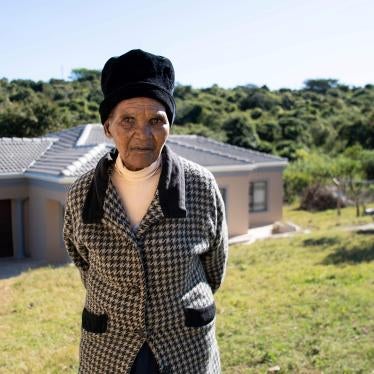Today, Human Rights Day, marks 75 years since the adoption of the Universal Declaration of Human Rights (UDHR). But for people like Gawabulla, a 75-year-old woman in South Africa, the declaration’s promises remain elusive.
Gawabulla spent over half her life living under South Africa’s apartheid regime, which denied most of the population – including today’s older people – a good education, decent jobs, and the ability to save for older age. Made homeless at 70 when her family moved out of their rented house, Gawabulla’s workplace and state pensions, totalling R3,500 (US$192) per month, were not enough to rent a new place. She now lives in a disused public hospital in Cape Town.
When Gawabulla showed me her room in the former hospital, home to over 1,000 residents, she said she felt “disgusted and ashamed.”
Her room is dark, paint peels off the walls, and a broken operating light still hangs from the ceiling. There is no running water and no bed. She sleeps on a couch barely big enough for a child.
Seventy-five years ago, the drafters of the UDHR did not explicitly include age as a prohibited ground for discrimination. Even now, the rights of older people often feel like an afterthought.
Over the last 12 years, states at the United Nations have discussed whether international human rights law adequately protects older people. Ample evidence shows it does not.
Human Rights Watch has exposed abuses against older people in armed conflict and their exclusion from responses to climate change-related emergencies. We have documented violations of older people’s right to live independently, from the widespread use of chemical restraints in care homes to a lack of home- and community-based support services. During the Covid-19 pandemic, we investigated the impact on older people of discriminatory age-based restrictions on movement.
The term “ageism” – the negative stereotypes, prejudices, and behavior toward older people and older age – had not yet been coined when the UDHR was adopted in 1948.
Since then, population ageing has become a global megatrend. Ageism is beginning to get the recognition it deserves. And there is greater awareness that older people’s rights need better protection under international law.
A new international convention on the rights of older people would provide the bedrock of that protection. Gawabulla has waited long enough. Her son and future generations should not have to wait another 75 years. UN member states should stop dawdling and start drafting.
** This article is part of a series marking the 10th anniversary of Human Rights Watch's Disability Rights Division.









